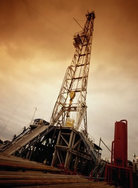
Investors are betting billions of dollars that oil will flow freely from wells being drilled in Kurdistan. The Financial Times reports that one small oil exploration company, Gulf Keystone Petroleum, already has a market capitalization of $1.9 billion, which would put it on the FTSE 250 index if it gets listed on the London Stock Exchange. Not bad for a company that has no proven reserves, has never earned any money for its investors, and has run operating losses every year of its existence.
Of course, Kurdistan is a pretty dangerous and unstable place. Just because you find oil today doesn't mean you will get to profit from it in the future.
So why does this company have a market capitalization of almost two billion dollars? Analysts say it is because investors are very confident that there are large oil reserves in the parts of Kurdistan where Gulf Keystone has been drilling. In fact, Gulf Keystone hit oil with its first well drilled in August 2009.
Ok. I can understand that line of thought. But this oil is in Kurdistan, a place that has been in almost continual violent conflict with Iraq since it was first recognized as an autonomous region in 1970. What about the very significant risks of violence, war, or even just political instability? How can a company afford all the security and insurance that must be necessary to cover those risks.
This is where we start to understand how the oil industry benefits from costs assumed by others. The ability to drill for oil in Kurdistan is a direct result of the hundreds of billions of dollars our governments have spent on the Iraq war and the ensuing seven years of efforts to stabilize that country. The door was opened, and it remains open, because of huge government investments and the personal sacrifices of hundreds of thousands of American, British, and other troops, including almost 5,000 Americans who lost their lives and more than 30,000 who were seriously wounded.
Next time we fill up our cars with relatively inexpensive gasoline, let's remember the hidden costs that are not reflected in the price. And let's also keep those costs in mind when we consider government investments in sustainable alternatives.
John Howley
Woodbridge, New Jersey
Of course, Kurdistan is a pretty dangerous and unstable place. Just because you find oil today doesn't mean you will get to profit from it in the future.
So why does this company have a market capitalization of almost two billion dollars? Analysts say it is because investors are very confident that there are large oil reserves in the parts of Kurdistan where Gulf Keystone has been drilling. In fact, Gulf Keystone hit oil with its first well drilled in August 2009.
Ok. I can understand that line of thought. But this oil is in Kurdistan, a place that has been in almost continual violent conflict with Iraq since it was first recognized as an autonomous region in 1970. What about the very significant risks of violence, war, or even just political instability? How can a company afford all the security and insurance that must be necessary to cover those risks.
This is where we start to understand how the oil industry benefits from costs assumed by others. The ability to drill for oil in Kurdistan is a direct result of the hundreds of billions of dollars our governments have spent on the Iraq war and the ensuing seven years of efforts to stabilize that country. The door was opened, and it remains open, because of huge government investments and the personal sacrifices of hundreds of thousands of American, British, and other troops, including almost 5,000 Americans who lost their lives and more than 30,000 who were seriously wounded.
Next time we fill up our cars with relatively inexpensive gasoline, let's remember the hidden costs that are not reflected in the price. And let's also keep those costs in mind when we consider government investments in sustainable alternatives.
John Howley
Woodbridge, New Jersey
 RSS Feed
RSS Feed